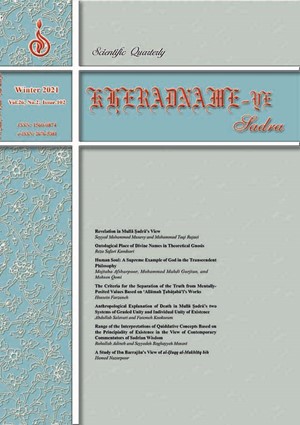-
-
List of Articles
-
Open Access Article
1 - Editor's Note
Seyyed Mohammad Khamenei -
Open Access Article
2 - Revelation in Mullā Ṣadrā’s View
Seyd Mohammad Musavi Mohamad Taghi Rajaee -
Open Access Article
3 - Ontological Place of Divine Names in Theoretical Gnosis
Reza Safari Kandsari -
Open Access Article
4 - Human Soul: A Supreme Example of God in the Transcendent Philosophy
Mojtaba Afsharpour Mohammad Mehdi Gorjian Mohsen Qomi -
Open Access Article
5 - The Criteria for the Separation of the Truth from Mentally-Posited Values Based on ‘Allāmah Ṭabāṭabā’ī’s Works
Hossein Farzaneh -
Open Access Article
6 - Anthropological Explanation of Death in Mullā Ṣadrā’s two Systems of Graded Unity and Individual Unity of Existence
Abdollah Salavati Fatemeh Kookaram -
Open Access Article
7 - Range of the Interpretations of Quiddative Concepts Based on the Principiality of Existence in the View of Contemporary Commentators of Sadrian Wisdom
Rohollah Adineh Roghayeh Mosavi -
Open Access Article
8 - A Study of Ibn Barrajān’s View of al-Ḥaqq al-Makhlūq bih
Hamed Nazarpour
-
The rights to this website are owned by the Raimag Press Management System.
Copyright © 2017-2026







